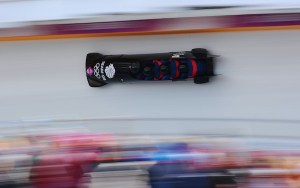With the Olympic Winter Games Beijing 2022 now over, we’re reflecting on what athletes competing for our partner Team GB can teach businesses about attaining peak performance.
This time around, we’re taking lessons in the power of adaptability, and in how data can guide adaptation, from Team GB bobsleigh athlete (and two-time Olympian and bronze medallist) Joel Fearon.
All successful athletes know adaptability is essential to achieving sustained success in sport (as it is in business). Personal circumstances and objectives change – and on a more general level sport is a hive of innovation. Adapting your training and strategy to meet (and beat) the competition – often by the smallest of margins – is all part of the game.
Still, it’s safe to say that Joel knows more about the demands (and rewards) of adaptation than most athletes, having excelled in not just one but two sports at the international level.
Not only has he won numerous medals in bobsleigh(including an Olympic bronze at Sochi 2014) – he’s also the fifth-quickest British sprinter over 100m of all time.
We spoke with Joel to find out more about his remarkable career – and to see what he can teach us about what it takes to win, whatever your circumstances or goals are.
From delivering pizzas to setting records
Today he’s an Olympic medallist, but Joel didn’t always feel destined for success.
Joel moved with his (now) wife and one-year-old son to Loughborough when he was 20 to start training to compete in athletics. The couple were on employment benefits at the time and Joel felt this was a “last chance saloon” for his athletic ambitions.
“Some kids are superstars from an early age,” Joel says, “But I didn’t have that luxury. I wasn’t really sure how good I actually was until I started training.”
Two years of training later, Joel began competing – and soon realised he was really good. But with a professional career still far from guaranteed, Joel had to work nights delivering pizzas to support his family. His doubts lingered.
But in 2012 Team GB Bobsleigh approached Joel and offered to fund and support his athletic career – and everything changed. It was official: Joel was (literally) off to the races.
For the next four years, Joel spent every winter season bobsleighing and every summer season sprinting – and made remarkable progress in both, as proved in spectacular style by two extraordinary athletic achievements.
“Two years after I started with Team GB, I won the bronze Olympic medal for bobsleigh,” says Joel. “Two years after that I ran 100m in 9.96 seconds at the English Championships – and became Britain’s fastest man.”
The necessity (and power) of adaptation
Easier said than done, of course – Joel had to work his (sprinting and bobsleighing) shoes off for this success, repeatedly transforming his physique in order to adapt to the demands of two very different sports.
“For bobsleigh, you have to be a bit heavier,” explains Joel. “So every winter I’d need to put on 15 kilos – and then lose it again every summer for sprinting. Every year, for ten years, with practically no rest.”
Over the last few years, many of our customers have been forced, like Joel, to rapidly and dramatically adapt, accelerating (or even initiating) digital transformation in order to continue operating and serving customers during a global lockdown.
And like Joel, they’ve been able to adapt so quickly and perform so successfully in no small part thanks to a canny use of data.
Data gives us direction
It’s no secret that elite athletes are using data to improve their performance (you can read a whole article we’ve written about it) – and Joel is no exception, having used data his whole career.
Joel tells us he’s spent countless hours analysing footage of his own performance to identify where his weaknesses lie – and how to fix them.
“Data is everything in sport these days,” he says. “As athletes, data gives us direction. Without it, you’re just guessing. You might know you’re not fast enough, but you don’t know why – or what to do about it.”
The impact of data doesn’t stop at the podium. Businesses that use dashboards to track data for a granular picture of their organisation have more clarity and confidence to make transformational decisions that encourage growth.
Clarity and direction are exactly what our platform gives customers, creating a single source of truth that every department in the business can trust – and refer to as a guiding light for their decisions.
Turning fine margins into major wins
“Success in sports is all fine margins,” Joel says. “When we won the bronze medal in Sochi in 2014, it was a 6.5-mile race – but we won by 11/100th of a second. Any tiny mistake would have lost us that medal.”
Unsurprisingly, Team GB Bobsleigh uses data to focus on improving the most minute, granular aspects of the performance of both its sleigh and team.
And when Joel is analysing his own performance, he focuses most of his attention on a comparatively small part of his bobsleigh runs – the start.
“In bobsleigh, it’s all about how much force you can generate over the first five metres of the 40-metre push,” says Joel. “I can look at how much time I spend covering that small distance and work out from that how quick I’m going to be by the end.”
Businesses also can use data to zoom in on key aspects of their performance, discovering otherwise invisible micro-insights that will help them adjust and improve. These changes might seem small – but they can add up to make a major impact on the success of your business.
Just as in bobsleigh, getting off to a flying start matters a lot in business, so it’s a wise idea to focus on the initial, ‘first five metres’ performance of new initiatives. That way, you can make adjustments early on that will help you succeed further down the track.
Passing on insights and finding self-worth
Now a senior athlete (at the grand old age of 33), Joel has become a mentor for his younger teammates – and is applying what he’s learned about analysing his own performance to help them identify and fix areas they’re struggling in.
Sharing performance-based insights is important in business, too, of course. And analytics solutions like Tableau make it easy for everyone in your business to both see and share datasets and insights in dashboard form – helping to drive performance across the board.
However, Joel’s teammates don’t just need technical help. Many struggle with self-confidence – a struggle Joel has gone through himself.
“All athletes battle a lot with self-worth,” Joel says. “Until I was successful, I was in a constant battle with myself over whether or not I could be successful.”
Having won a hard-fought battle with his own doubts, Joel is keen to pass on a sense of self-worth to an even younger generation, and since 2018 has been visiting schools with the charity Speed Work to give inspirational talks to pupils.
“My message to kids is that they’re all special and have massive worth,” Joel says. “But also that you have to work hard and step out of your comfort zone to fulfil your potential. I tell kids that being scared is natural. And it’s okay – as long as you don’t let it stop you from chasing your dreams.”
Whatever your goal, winning starts with learning
Feel the fear… and chase your dreams anyway. That’s advice from this self-made athletic superhero that we should all look to follow – in business and in life.
Exceptional athletes like Joel Fearon have so much to teach businesses about competing, collaborating and mentorship. That’s one reason we’ve partnered with Team GB.
Ready to get started? Pick up more Olympian tips for success and learn more about how your business can use data to improve performance.

























